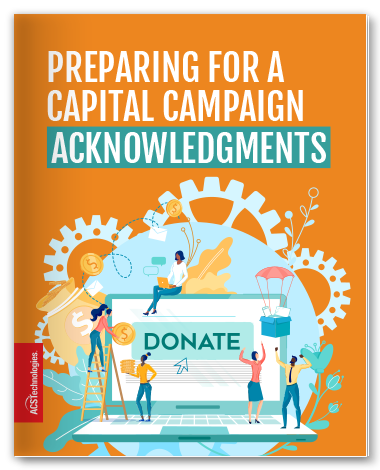Preparing for a Capital Campaign Part 2 of 4
Properly thanking and recognizing donors is not a strong suit for most charitable organizations. Churches are especially inconsistent with their stewardship of givers. When preparing for a capital campaign, we must ensure that we have both a plan and a posture for donor acknowledgment.
Our churches can take donors for granted in several key ways. Too often, we miss opportunities to thank them, and in doing so, we lose chances to keep them engaged and excited about their investment in our mission.
Preparing your church
We’ve been discussing how to best prepare your church for a campaign and the key components that help ensure success. In this blog series, we’re unpacking how we treat our donors through the fundamentals of acknowledgments.
Acknowledgment is the foundation of any relationship. Consider personal or pastoral relationships a model for being seen, heard, and feeling connected. Those needs don’t change when the person involved is a donor. It’s probably easy to bring to mind conversations or meetings you’ve been in where the other party simply wasn’t attuned to you or acknowledging you. Perhaps they spent most of the time talking about themselves or their work without reciprocating. That’s the kind of posture we have to avoid with our prospects and donors: keep the focus on them.
Share
If we build our donor relationships well, we will have ample opportunity to share about our church, its mission, our campaign projects, and even our own ministry. That will come naturally. Too often, I see pastors, CEOs or fundraisers abandon their relational gifts because the person they’ve been introduced to is a potential donor. They go right into “pitch mode,” trying to cram everything about their mission or project into an introductory meeting. They often miss the cues when a donor’s eyes glaze over. Or worse, they’ve not made an authentic connection to the donor’s passion and interests.
Resist that temptation and know that approaching this person as a person and keeping the focus on them will reap mutual and long-term rewards. (There’s a reason I titled one of my books Donors are People Too!)
Relationships
In prior blogs and videos, we’ve discussed the four-part cycle of donor relationships and how more than 80 percent of our time with donors needs to be spent on relationships and trust-building. As you head into a capital campaign, don’t allow that to change your balance and how you handle your time with prospects and donors. Continue to keep the focus on them, and know that the authentic relationship you build will allow you to naturally and organically engage that donor when the time is right.
Up next in this series on donor acknowledgments in a capital campaign. We’ll talk about valuing donor time and how you earn the right to make an ask of a prospect.
For more information on consulting for Capital Campaigns, visit ACST’s Consulting pages.
The Foundation of a Successful Capital Campaign is Built on Donor Acknowledgment
When a capital campaign isn’t successful, it usually comes back to a handful of common mistakes organizations make. Not preparing adequately is at the top of the list.
Churches, especially, often rush into and launch a campaign too quickly. It’s understandable. But there are systems and processes to ensure you don’t miss the mark or kick off a campaign with a goal you can’t achieve.
Considering a Capital Campaign?
Capital campaigns are a daunting task, even under the best circumstances. If you’ve been considering — or putting off — a capital campaign to raise funds to grow your church or expand your ministry, the solution is here.
ACS Technologies® teamed up with Non-Profit DNA to offer an extensive and comprehensive consulting service to help make your upcoming capital campaign a success. Through this partnership, you’ll have access to highly skilled, knowledgeable fundraising experts. They will help with your campaign — every step of the way.
Visit Capital Campaigns on our website to request your consultation today!
Tim has over 30 years of experience in Church, Non-Profit Administration, Management, and Fund Development. Serving as an Executive Pastor and Chief Development Officer in growing Churches and Non-Profit Organizations. He has provided a wide range of expertise and resources. Tim serves as the Founder and CEO of Non-Profit DNA. A boutique firm committed to helping nonprofits and churches. By building their capacity through fundraising, leadership, team building, staff recruiting, and coaching.





